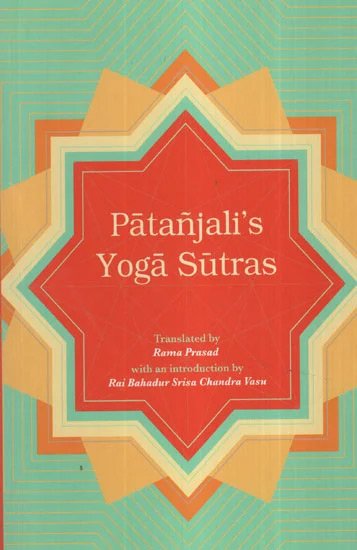Yoga-sutras (with Vyasa and Vachaspati Mishra)
by Rama Prasada | 1924 | 154,800 words | ISBN-10: 9381406863 | ISBN-13: 9789381406861
The Yoga-Sutra 3.53, English translation with Commentaries. The Yoga Sutras are an ancient collection of Sanskrit texts dating from 500 BCE dealing with Yoga and Meditation in four books. It deals with topics such as Samadhi (meditative absorption), Sadhana (Yoga practice), Vibhuti (powers or Siddhis), Kaivaly (isolation) and Moksha (liberation).
Sūtra 3.53
Sanskrit text, Unicode transliteration and English translation of Sūtra 3.53:
तारकं सर्वविषयं सर्वथाविषयम् अक्रमं चेति विवेकजं ज्ञानम् ॥ ३.५३ ॥
tārakaṃ sarvaviṣayaṃ sarvathāviṣayam akramaṃ ceti vivekajaṃ jñānam || 3.53 ||
tārakam—the intuitional. sarva-viṣayam—having everything (sarva) for its Sphere of operation sarvathā-viṣayam—(sarvathā) having all conditions (viṣaya) For its sphere of operation. akramam—having no succession. ca—and. iti—this.
53. And it is the intuitional; has everything for its sphere-of-operation; has all-condition for its sphere-of-operation; has no succession. This is the entire discriminitive knowledge.—159.
The Sankhya-pravachana commentary of Vyasa
[English translation of the 7th century commentary by Vyāsa called the Sāṅkhya-pravacana, Vyāsabhāṣya or Yogabhāṣya]
[Sanskrit text for commentary available]
It is intuitional:—This means that the knowledge comes by one’s own prescience and not by teaching.
Has everything for its sphere of operation:—This means that there is nothing yet known, which might not be made its object.
Has all conditions for its sphere:—The all, as it was or will be, or is with all minor modes of expression. It means that he knows all the conditions of these objects.
Has no succession:—It means that he takes in the ‘all’ as correlated to but one moment.
This is the entire discriminative knowledge:—The light of Yoga is part of this only, beginning with the Madhumatī up to the end of this knowledge.—159.
The Gloss of Vachaspati Mishra
[English translation of the 9th century Tattvavaiśāradī by Vācaspatimiśra]
Having thus described one branch of discriminative knowledge, the author now describes discriminative knowledge:—‘It is intuitive; has everything as the sphere of its operation; has all conditions as its sphere; has no succession; this is the entire discriminative knowledge.’
‘Discriminative knowledge’:—This is the statement of the thing defined. The rest is the description. Intuition is called Tāraka, because it becomes the cause of crossing the ocean of the universe. He distinguishes this from the knowledge by prescience already described:—‘Has all conditions for the sphere of its operation.’
‘Modes of expression’ means minor modes of differentiation. For this reason the knowledge of discrimination is complete. There is nothing anywhere which may not at any time or in any way be its object. This is the meaning. There may be other knowledge obtained by cognitive trance, but that also is a part of this, and where therefore can there be any knowledge beyond this? It is for this reason complete. The Commentator says this:—‘The light of Yoga, i.e., the Cognitive Yoga, is a part thereof.’
Now he says what is the beginning and what is the end:—‘Beginning with the Madhumatī, &c.’ The truth-bearing cognition is the Madhu, honey, because it causes, such sweet bliss. The meaning is, ‘having obtained the purity of cognition as described.’ The Madhumatī is that state which is possessed of that and gives sweet bliss. The mind having reached that state, manifests up to the end of that state, passing through sevenfold stages of intellectual progress. It is for this reason that discriminative knowledge becomes intuitional, inasmuch as its branch, the light of Yoga, is intuitional.—53.
